I was invited to give a talk at the University of Colorado Boulder this February. I love going to other campuses and getting to know their faculty and students—and this one came with an added bonus. From 2002 to 2004, I was a Creative Writing MFA student at Naropa University, which is UC Boulder’s much younger, smaller, and substantially more counterculture neighbor. You can literally see one campus from the other, but I’d seen neither campus since the summer I graduated. Twenty-one years is a long time to be away. Would I recognize everything that had been so familiar? Would I find my former self somewhere in the spaces of her past?
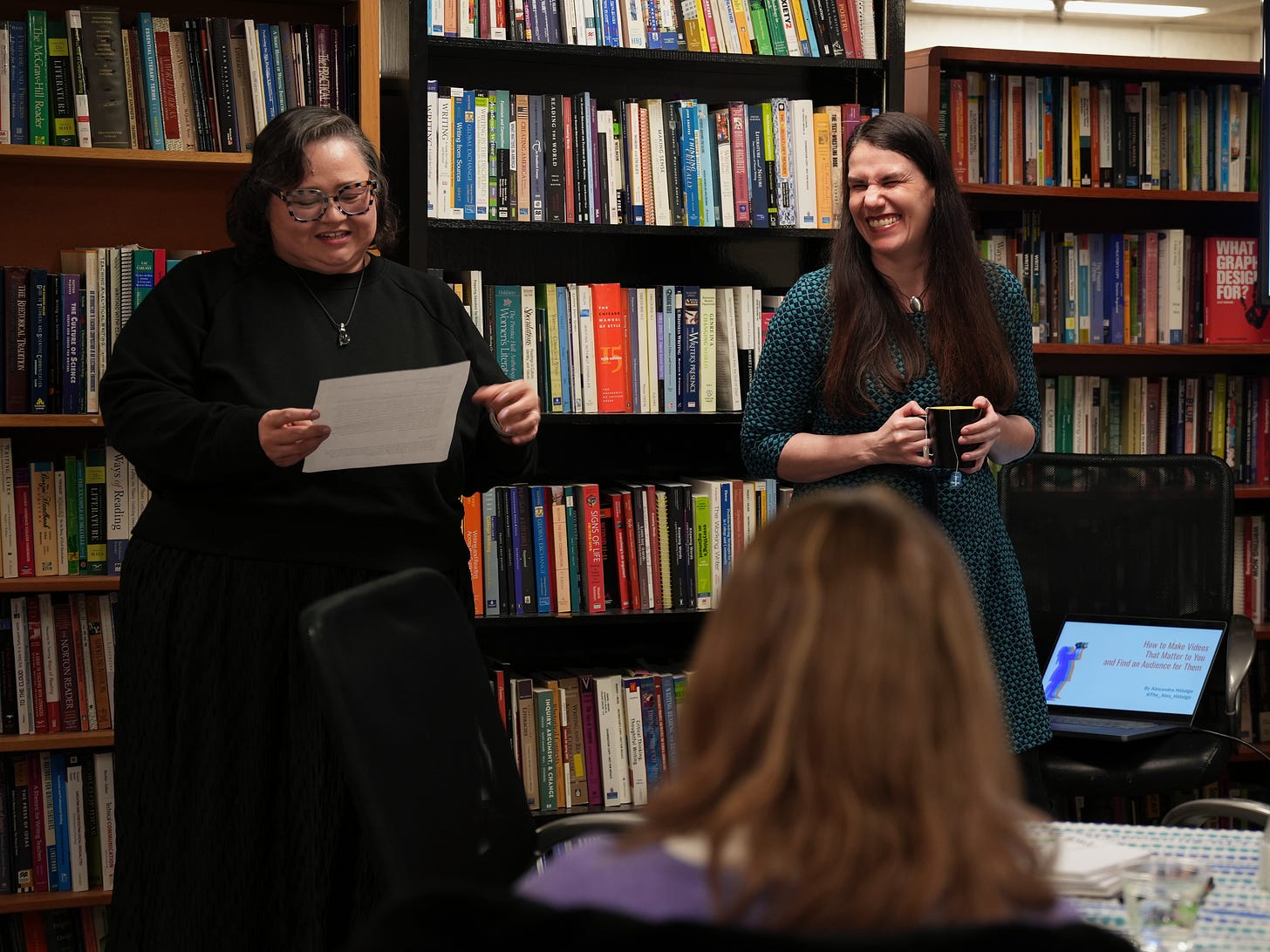
I had little time to answer those questions when I arrived in Boulder. I loved giving my “How to Make Videos That Matter to You and Find an Audience for Them” presentation and providing feedback to CU faculty Nisha Shanmugaraj and Jaquetta Shade on their (brilliant and desperately needed) scholarship. When I taught at Michigan State, I was on Jaquetta’s dissertation committee. During dinner, we caught up on our lives and reminisced about the friends and places we’d left behind in Michigan. It felt like coming home, and I wondered if I’d feel the same when returning to Naropa, where I no longer knew anyone. I’d be visiting a place, not a person.

During my last day in Boulder, I went back to the campus that shaped me. My MFA was my first graduate degree, and although I didn’t realize it then, Naropa has a uniquely nurturing approach to education. We drank delicious chai from the Naropa café, which had no disposable plates or silverware. Not everyone took their leftovers back, so plates caked with crusty hummus were scattered around our very small campus. One of our graduation requirements was to take yoga and meditation classes, and our faculty would play a gong at readings. My beloved mentor Bobbie Louise Hawkins famously said that she didn’t hold hands in circles (and she sure didn’t). The rest of us did, though, in literal and metaphorical ways. We held hands and closed our eyes, seeking a sense of connection. We didn’t always find it, but we did look.
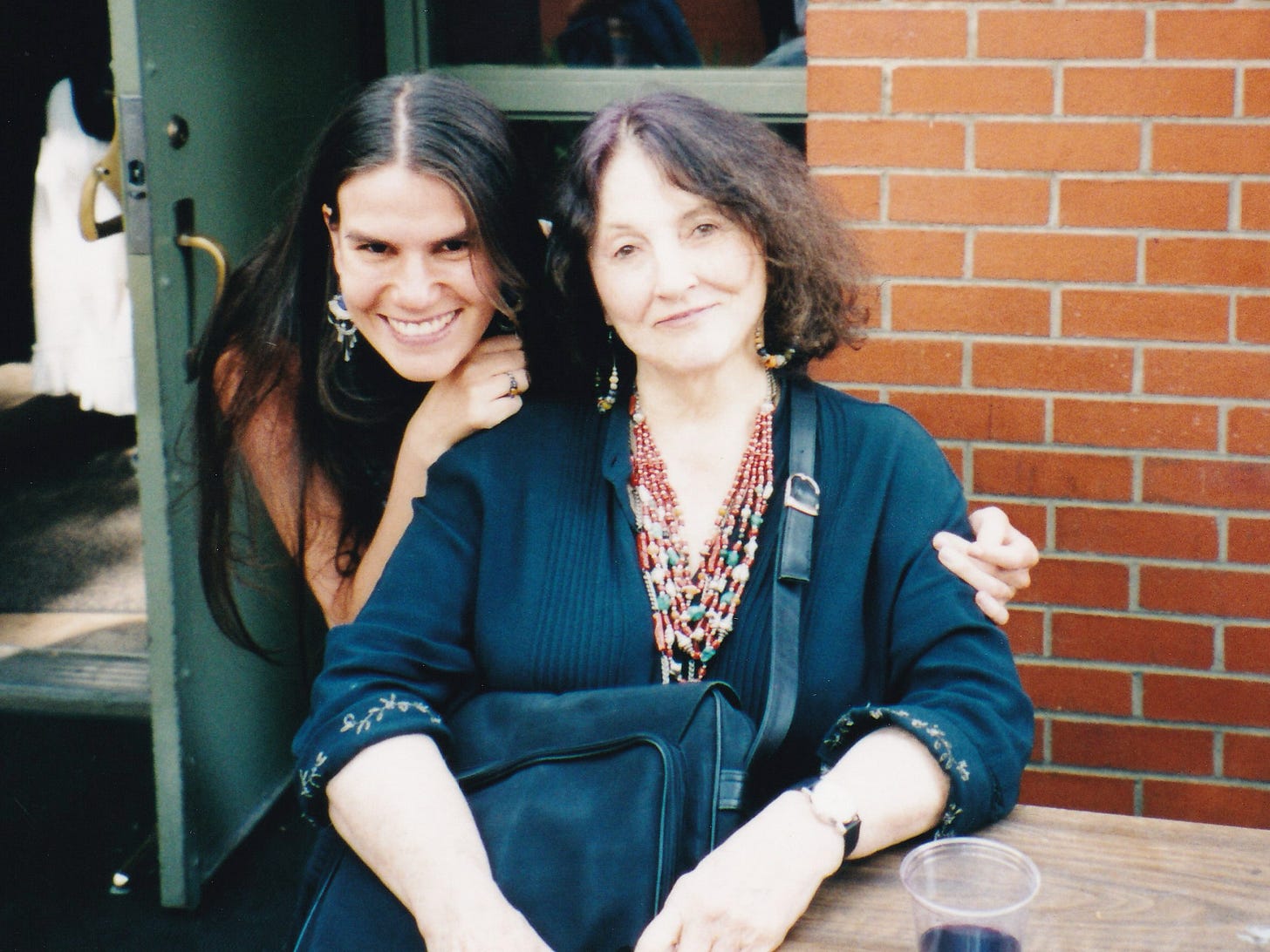
I loved my time at Naropa so much that I stayed an extra summer to help run the famed Summer Writing Program (SWP) during its 30th anniversary. When they offered my husband Nate a job serving wine and beer at the SWP’s weekly receptions, they warned us about the SWP curse. No couple that worked on planning the SWP over the same summer had stayed together. Nate took the job anyway. We felt like we could break the curse—and we sure could use the money.
I wished Nate had been with me as the Uber dropped me off at Naropa on a frigid afternoon, camera and tripod in hand. As can happen with childhood places, the campus seemed smaller than I remembered. I walked around trying to place the buildings as I wondered what my 27-year-old self would say about the fact that I was 47 and still querying agents for my first novel. And no, I haven’t spent the last two decades writing novels. I’ve done a million other things. Would my former self approve of my countless (mostly fruitful) detours? I tried to read her thoughts on how our life turned out as I explored the campus in search of its (and my) past.
Here’s what I found and what I learned about visiting a place that was once yours:
After filming, I sat at the new Naropa café, admiring its lush plants and colorful decor. I savored the chai—it tasted as divine as it used to—as students walked by, engrossed in passionate conversations. I heard a young man on the table next to me chat with a passerby about the writing classes he was taking. I couldn’t keep from asking if he was in the MFA program, and as luck would have it, he sure was. His name is Isaac Hollandworth, and he’s finishing his thesis and has a poem coming out in the next issue of Bombay Gin (which is where I published my first story).
As Issac and I conversed, we were joined by Jeffrey Pethybridge, the SWP’s current director. I should have asked Jeffrey if he knew about the curse Nate and I broke. I’m guessing he didn’t since broken curses aren’t as memorable as ongoing ones. From Jeffrey and Issac, I learned that much of what I loved about Naropa was still intact. Their philosophy of nurturing and their passion for making art that matters in ways beyond book sales. The people who made Naropa matter to me, however, were no longer there. Most of the faculty I knew at Naropa were working elsewhere, retired, or no longer in the world. Anne Waldman—one of the Writing Program’s legendary cofounders—now lives in New York for most of the year. I wondered how there could be a Naropa without Anne and Bobbie, who passed away in 2018. But Allen Ginsberg was no longer with us when I studied there. My version of Naropa was just an iteration of it, albeit the one that made sense to me. I hope Isaac and Jeffrey’s iterations make sense to them too.
The Sunday after I got back to Pittsburgh, I was editing the footage of my visit when Nate handed me a letter from my dear friend and fellow Naropa alum Andrew Wille. In his enviably whimsical penmanship, Andrew was continuing the conversation we’d been having for months. He’s been encouraging me to write a new novel while I query agents for my first novel, Grand Gestures. I’ve been working on Grand Experiments, the sequel, but as Andrew keeps on reminding me, that’s a risky move when the first one hasn’t sold yet.
I didn’t have another novel, however. Four years ago, Grand Gestures landed on my head while I was dancing in my living room, something I do every night. I don’t come up with new projects. They find me, and no project seemed to be coming my way.
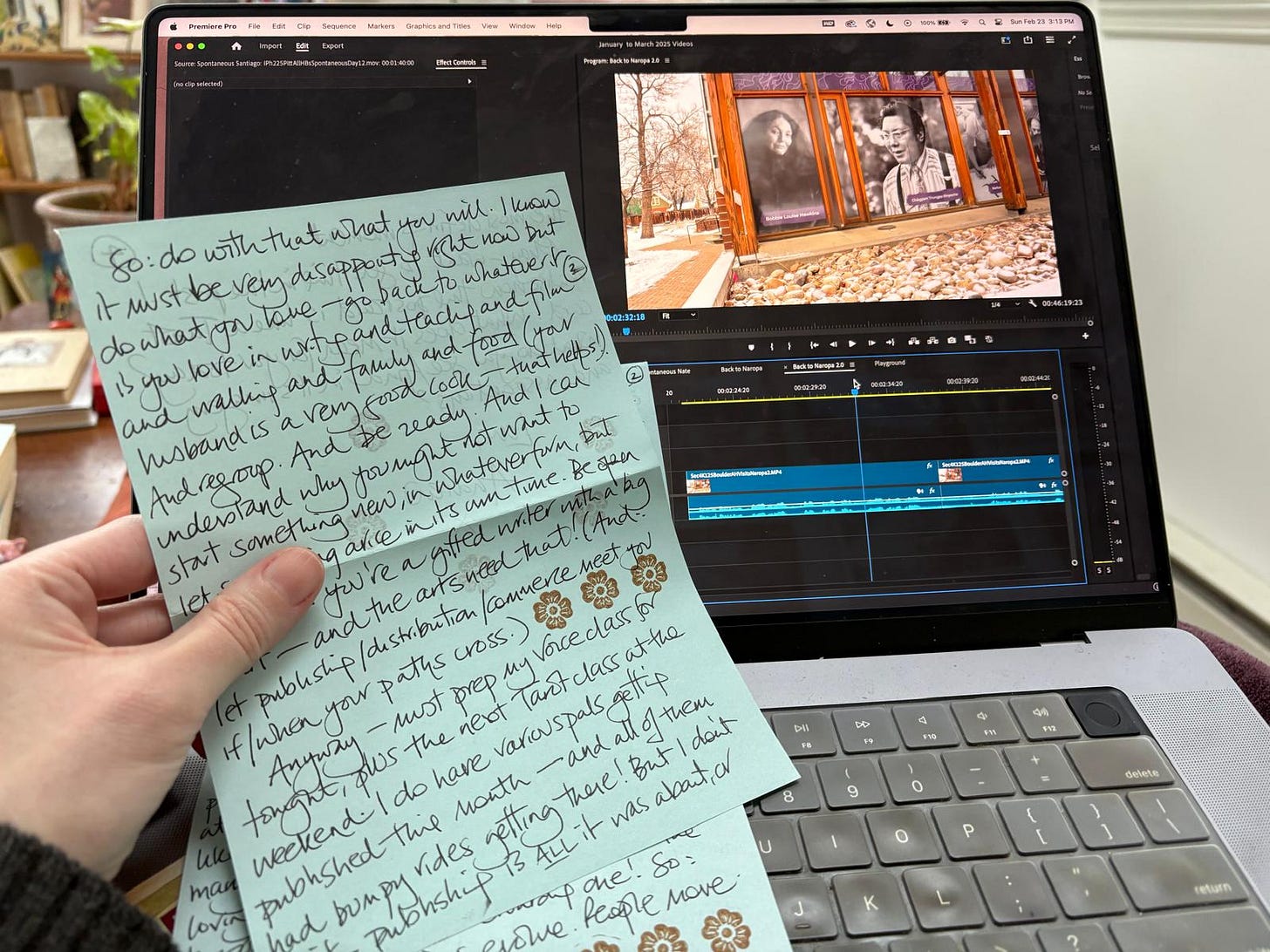
As I read Andrew’s letter, I bristled at and felt embraced by the warmth of his words, “I can understand why you might not want to start something new in whatever form, but let something arise in its own time. Be open to that as you’re a gifted writer with a big heart—and the arts need that.”
The next morning (on February 23) life cracked me open. I went to observe my PhD advisee Megan teach at 9am, a time at which my brain is never on. Her teaching was marvelous, but as her class came to a close, I put my computer and my not-quite-closed water bottle in my purse. Water and computer came together, and as if they were playing rock, paper, scissors, the water demolished the computer.
Having my computer die on me was traumatic enough, but having it die minutes before I was supposed to Zoom into a dissertation defense sent me into a colossal tailspin. I managed to make Zoom work on my phone, and although they could barely hear me, I joined the rest of the committee in providing feedback for Claire’s extraordinary dissertation. That night, as I checked my email on my son William’s computer, I got a kind and eloquent rejection from one of the agents who’d requested the full manuscript for Grand Gestures:
Thanks so much for the chance to read GRAND GESTURES. You are a stunning writer, and I fell right into this one. There is so much that is so wonderful, but ultimately I found myself struggling with the narrative of a marriage falling apart (even as it comes back together). It's something I always dislike as a reader, which isn't fair - your query was very clear! - but tells me I'm not the right fit. Your writing is so good that someone else is going to snap this one up, so I'll step aside.
Is someone else going to indeed snap it up? I don’t know. Other agents I’ve talked to have pointed out it’s hard to sell an upmarket women’s fiction debut that’s 106,000 words long. It’s easier to sell 85,000-word debuts.
I wept as I did my nightly living-room dance to Celia Cruz. Celia’s earth-mother/don’t-fuck-with-me voice and the music’s salsa rhythms expelled the day’s stress and a much older sorrow: The sorrow of a girl who’d gotten her MFA at Naropa and wasn’t just querying her first novel at 47, but also finally coming to terms with the fact that she needed to write a new novel. If Grand Gestures didn’t sell as my first book, it might sell as my second (if the first one did well). But what was that mythical high-performing 85,000-word debut? I didn’t have one.
As the tears subsided, something opened inside me, and two women walked in and told me about themselves. They kept talking long after the dancing was over. I slept poorly that night, writing ideas in the red Kiki’s Delivery Service notebook I keep on my bedside table for nights like these. By morning I had a pitch:
Ori, a 19-year-old aspiring writer raised in an idyllic small town in the Venezuelan Amazon, sets off on a quest when her mother hands her a letter from her deathbed. When Ori arrives in Pittsburgh to deliver the letter to her estranged grandmother Rima, she learns that Rima had no idea Ori existed.
Nate and Andrew love it, which cinched it for me. The working title is Ori and Rima, and I’ve spent the last two weeks understanding granddaughter and grandmother and outlining a plot around who they are and what they want. When the semester ends and I have more time, Ori and Rima will become words on the page. Is it foolish to chase this dream? Definitely. But I’ve had plenty of foolish dreams come true. Certainly not all of them, but enough that I’ll take my chances. Anyway, I’m not sure I have a choice. When my characters get here, they get here.

I still don’t know what my Naropa self would think of my life today. She’d be thrilled that Andrew and I are such close friends two decades later, and that my marriage has not succumbed to the SWP curse. And she’d be so in love with our sons William and Santiago that she might ignore everything else… but only for a while.
What would she think about the woman I’ve become? I don’t know how to answer that. So much of who I am is shaped by my relationships and the stories I tell that it’s hard to think of myself outside of them. She’d like Ori and Rima, at any rate. As a matter of fact, she’d love them. I already do.
PS: Pitt graciously fixed my poor computer. I named her Celia and bought her a maroon bag so she and water may never meet again.
PPS: This post was too long to add recommendations, but I’ll be back to them next month.
Your Turn
Have you ever gone back to old places after decades of being gone? What was it like? Do you ever wonder what your former self would think of you? Do your new projects find you or do you find them?




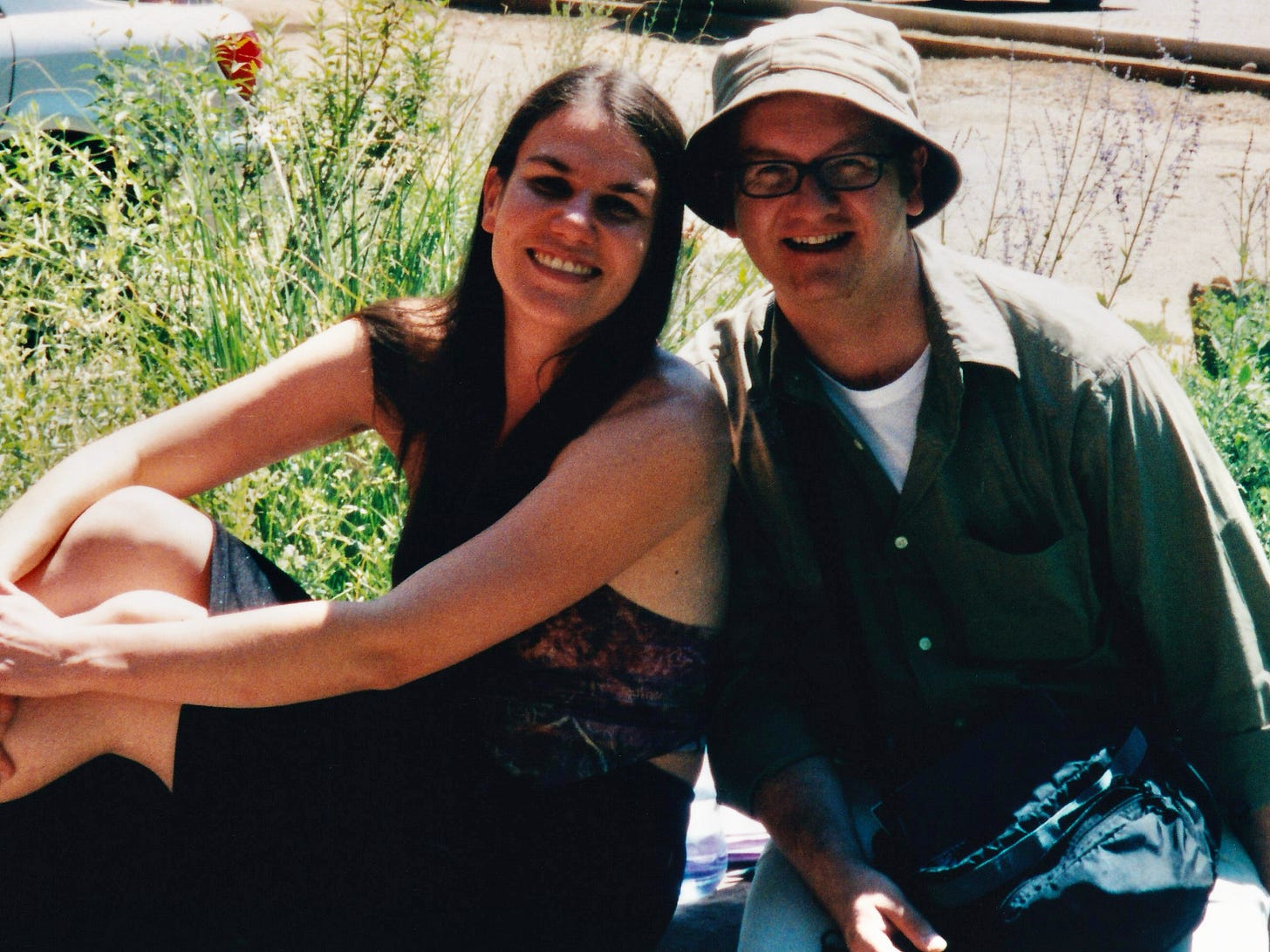

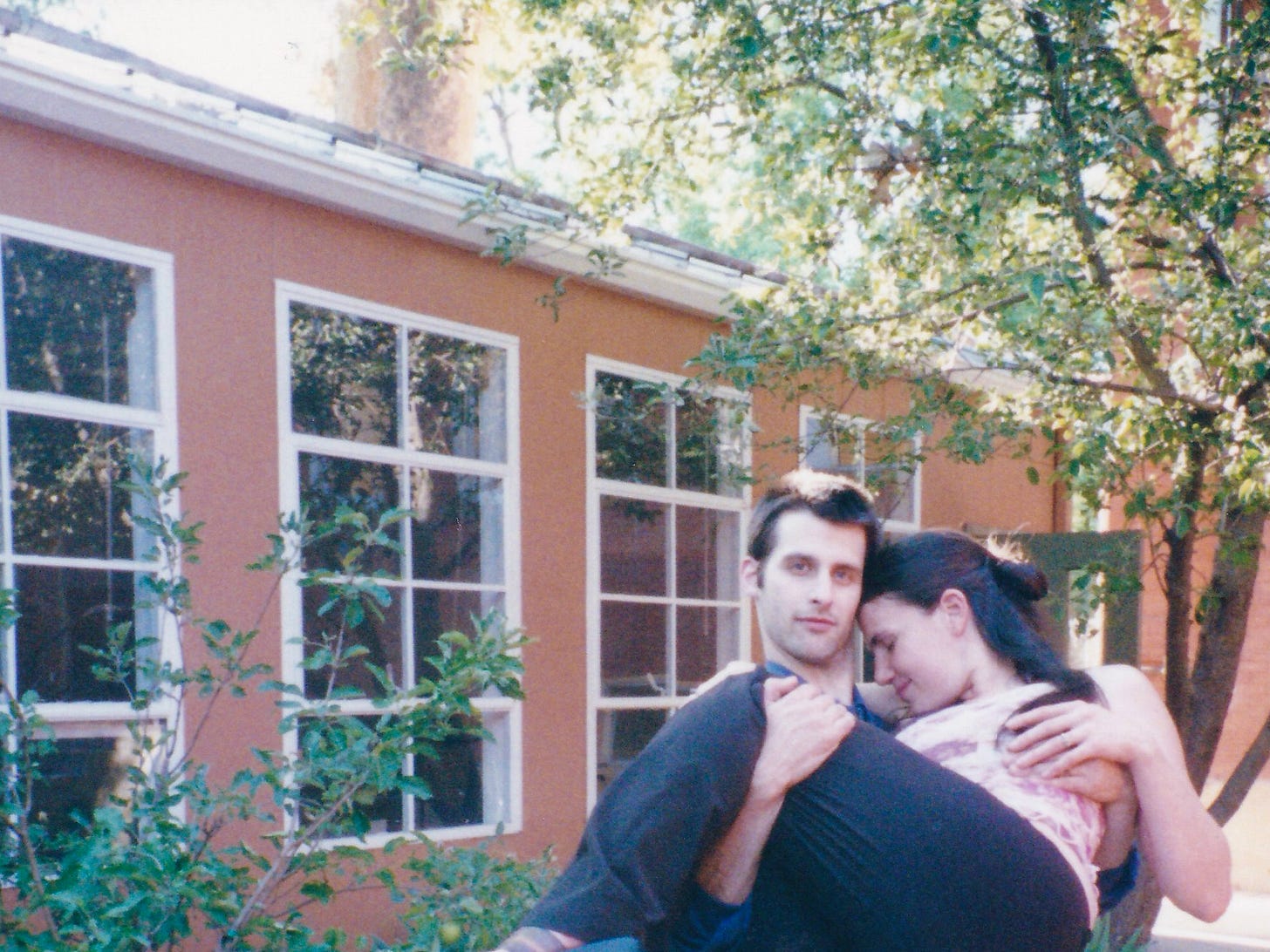
thank you for the lushness and honesty of this sharing. I once went back to the house i grew up in on farmland and its four rooms.. The people knew my "dad" so they let me in. HORRIFIED i smiled as they showed me the ugliest paneling and indoor outdoor carpeting.. I managed to say nice things; yet when i got back in the car i wept and never revisited a home i inhabited again.
Love this! So excited for your new project!